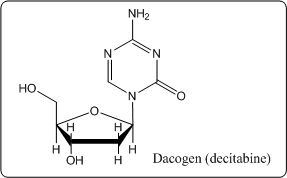- For Print
- June 7, 2011
Eisai Co., Ltd. (Headquarters: Tokyo, President & CEO: Haruo Naito, “Eisai”) announced today that results from the Phase III (DACO-016) study of DNA methylation inhibitor Dacogen® (decitabine) for Injection in acute myeloid leukemia (AML) were presented during an oral session at the 2011 Annual Meeting of the American Society of Clinical Oncology (ASCO). AML is a life-threatening cancer of the blood for which there are limited treatment options.
The 485-patient, open-label, multi-center study compared Dacogen® versus patient's treatment choice (TC) of either supportive care or low-dose cytarabine in older patients with newly diagnosed de novo or secondary AML. The primary endpoint of the study was overall survival.
The results of the analysis showed that at the protocol-defined clinical cutoff, with 396 (81.6%) deaths, Dacogen® demonstrated an overall survival advantage but did not demonstrate statistically significant superiority over the control arm. Specifically, patients treated with Dacogen® had a median survival of 7.7 months (95% confidence interval (CI): 6.2, 9.2) versus 5.0 months (95%CI: 4.3, 6.3) in the TC arm (hazard ratio (HR) 0.85; p=0.108).
Furthermore, the updated analysis, conducted with an additional year of patient follow-up, demonstrated the same median overall survival benefit for patients treated with Dacogen®. With 446 (92%) deaths, it showed that patients in the Dacogen® arm had a median survival of 7.7 months (95%CI: 6.2, 9.2) versus 5.0 months (95%CI: 4.3, 6.3) in the TC arm (HR 0.82; nominal p=0.037).
Adverse events observed in the study were consistent with the known Dacogen® safety profile and without major differences between the treatment arms. The most commonly reported Grade 3 or 4 adverse events were thrombocytopenia (reported in 40%, 32%, 35% and 14% of subjects in the Dacogen®, TC, cytarabine and supportive care groups, respectively), anemia (34%, 25%, 27% and 14%, respectively), neutropenia (32%, 42%, 20% and 3%, respectively) and febrile neutropenia (32%, 22%, 25% and 0%, respectively).
Based on these results, it was announced at this year's ASCO Annual Meeting that, compared with the accepted standard therapies used in this study to treat older patients with AML, for which treatment options are particularly limited, Dacogen® showed a clinically relevant overall survival advantage without major differences in safety.
[ Please refer to the following notes for further information on the DACO-016 study and Dacogen® ]
Media Inquiries:
Public Relations Department,
Eisai Co., Ltd.
+81-(0)3-3817-5120
< Notes to editors >
1. About the DACO-016 Study
DACO-016 was a Phase III randomized open-label, multi-center trial comparing Dacogen® versus patient's choice with physician's advice of either supportive care or low-dose cytarabine in patients 65 years and older with newly diagnosed de novo or secondary acute myeloid leukemia (AML) and with poor- or intermediate risk cytogenetics.
Of the 485 patients, 242 were randomized to Dacogen® and 243 to patient's choice of supportive care or low-dose cytarabine. Dacogen® was administered at 20 mg/m2for one hour by intravenous infusion once daily for five consecutive days repeated every four weeks, continued as long as the patient derived benefit. Patients treated with cytarabine received 20 mg/m2subcutaneously once daily for 10 consecutive days every four weeks. The median duration of treatment for patients on Dacogen® was 4.4 months, compared with 2.4 months in the cytarabine group.
2. About Dacogen®
Dacogen® is approved in the United States for the treatment of patients with myelodysplastic syndromes (MDS), including previously treated and untreated, de novo and secondary MDS of all French-American-British (FAB) subtypes (refractory anemia, refractory anemia with ringed sideroblasts, refractory anemia with excess blasts, refractory anemia with excess blasts in transformation, chronic leukemia), and Intermediate-1, Intermediate-2 and High-Risk International Prognostic Scoring System (IPSS) groups.

